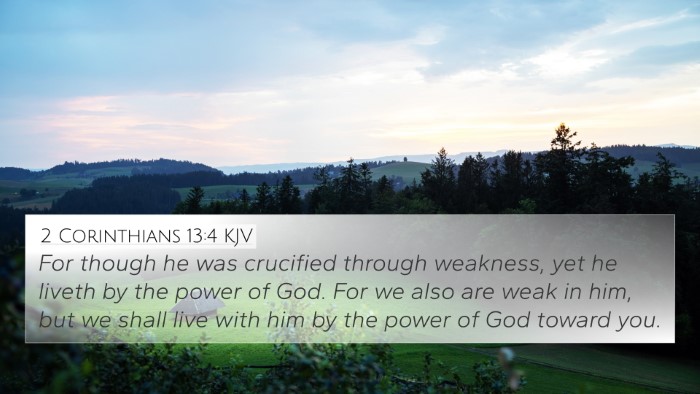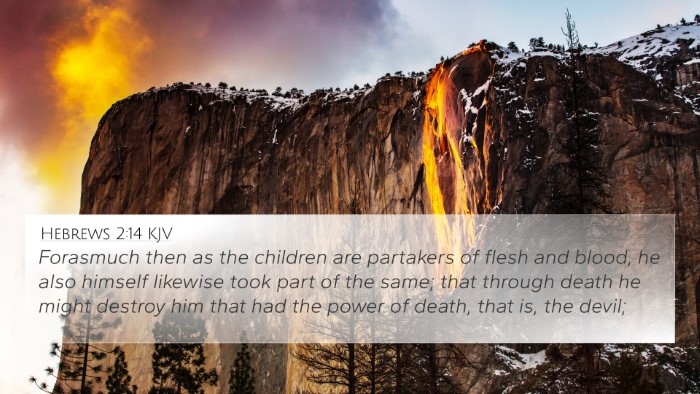Understanding Leviticus 14:5
Leviticus 14:5 states, "And the priest shall command that one of the birds be killed in an earthen vessel over running water." This verse is part of the ceremonial laws regarding the cleansing of a leper, highlighting the intricate process that involves the priest as an intermediary and the symbolism of sacrifice.
Summary of Key Themes
- Symbolism of Sacrifice: The bird's death serves as a vivid representation of atonement, reflecting the greater sacrifice of Christ in the New Testament.
- Role of the Priest: The priest’s involvement signifies the essential function of mediators in reaching God during Old Testament times.
- Purity through Ritual: The use of running water symbolizes purification and the washing away of sin, reinforcing the importance of cleanliness before God.
Commentary Insights
Matthew Henry's Commentary
Matthew Henry emphasizes the meticulousness of God's laws, denoting that the cleansing process is not merely physical but serves a spiritual purpose. The killing of the bird as a sacrifice indicates the seriousness of sin and the need for atonement, foreshadowing the ultimate sacrifice of Jesus Christ.
Albert Barnes' Notes
Albert Barnes highlights the significance of the earthen vessel in which the bird is killed. He suggests that it represents humanity's fragility. The act of killing the bird over running water illustrates the need for a fresh start and the removal of the leper’s affliction, symbolizing hope and renewal.
Adam Clarke's Commentary
Adam Clarke elaborates on the symbolism of the running water, identifying it as a representation of life and purity. He interprets the act of killing the bird as a necessary part of the broader ritual of cleansing, emphasizing that it signifies a deeper spiritual truth about sin and redemption.
Bible Verse Cross-References
- Hebrews 9:22: "And almost all things are by the law purged with blood; and without shedding of blood is no remission."
- Matthew 5:23-24: Instructing reconciliation before offering sacrifices.
- 1 Peter 1:19: Relating to Christ as a lamb without blemish.
- Leviticus 14:4: The previous instructions regarding the cleansing ceremony.
- Exodus 30:18-21: The significance of water in the Tabernacle context.
- Psalm 51:7: "Purge me with hyssop, and I shall be clean." A plea for cleansing.
- Luke 17:14: Jesus instructs lepers to show themselves to the priests.
- Revelation 7:14: The imagery of washing robes reflects the ultimate cleansing.
Thematic Connections Between Bible Verses
The verse in Leviticus also demonstrates the connections and overarching themes present throughout the Scriptures. The concept of cleansing from leprosy parallels both physical and spiritual healing seen in the New Testament, particularly in Jesus’ miracles. This theme of cleansing and sacrifice communicates a unifying thread across biblical texts, showing the continuous need for redemption and the hope offered through faith.
Understanding the Importance of Cross-Referencing
Tools for Bible cross-referencing, such as a Bible concordance or cross-reference Bible study guides, can help readers delve deeper into these connections. By understanding how verses relate to each other, the reader gains richer insights into the text, enhancing their overall comprehension and appreciation of biblical teachings.
Encouragement for Further Study
For those seeking to explore inter-Biblical dialogue, it is helpful to identify links between Old and New Testament passages. Engaging in a comparative Bible verse analysis can reveal profound theological insights and deepen one’s understanding of faith. For instance, examining how leprosy in the Old Testament symbolizes sin can lead to a greater appreciation of Jesus’ healing miracles and their spiritual implications.
Conclusion
Leviticus 14:5 provides a rich tapestry of meaning that resonates throughout Scripture. By leveraging comprehensive Bible cross-reference materials and employing cross-referencing methods, individuals can uncover the interconnected nature of God’s redemptive plan. As we reflect on this verse, let us be mindful of its implications for personal purification, redemption, and our relationship with God through Christ.








